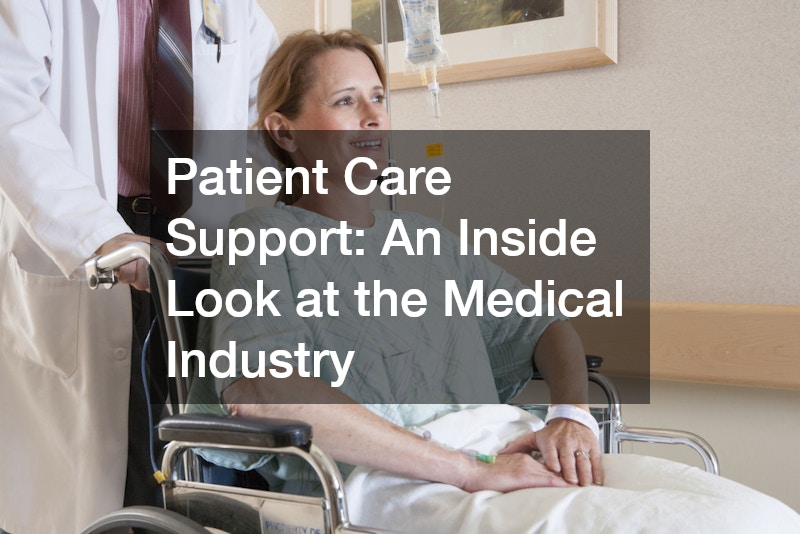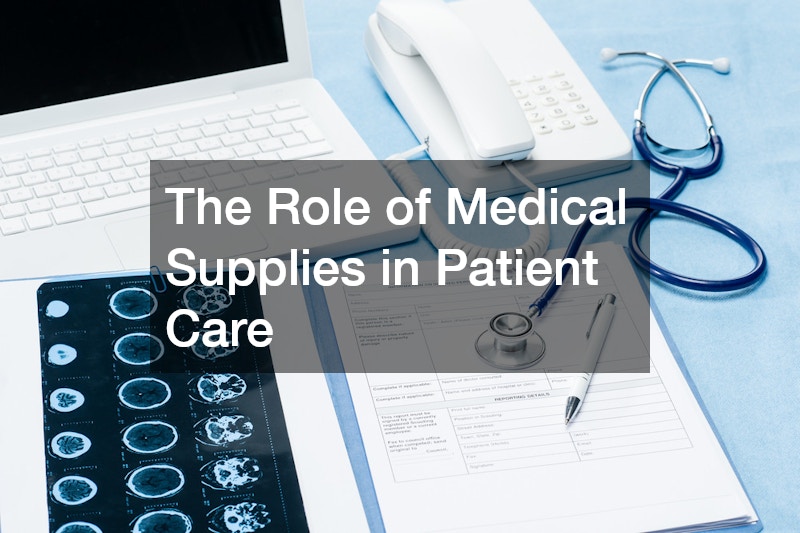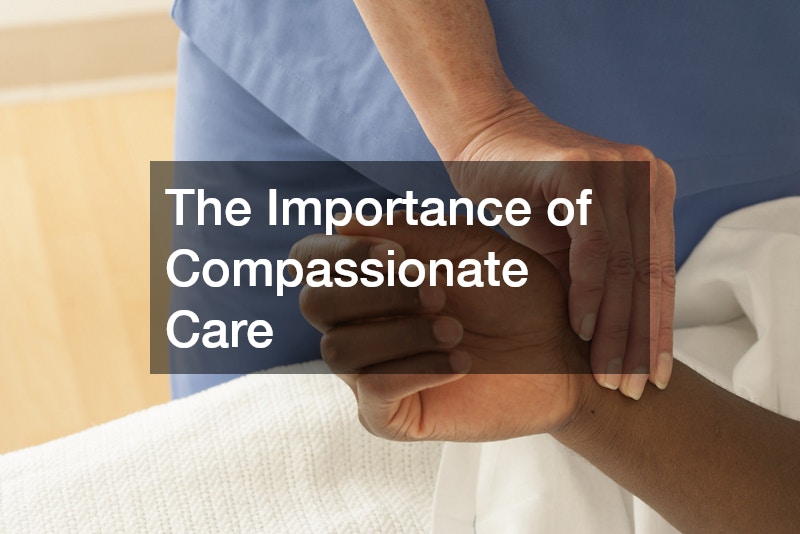
Disclaimer: This website provides health information for educational purposes only and is not a substitute for professional medical advice, diagnosis, or treatment. Always seek the guidance of a qualified healthcare provider with any questions you may have.
In the modern healthcare system, patient care support is a critical component that ensures patients receive the best possible care across a range of medical services. From routine check-ups to specialized treatments, healthcare professionals are dedicated to providing assistance tailored to individual needs. This article explores the many aspects of patient care support, including services offered in various medical fields, the roles of healthcare workers, and how innovations in technology and treatment practices are improving outcomes. By understanding these facets, we gain a deeper appreciation of the support systems that help patients navigate the complexities of medical care.
The Role of Patient Care Support in Everyday Healthcare
Patient care support is at the heart of the healthcare system, providing patients with the resources and guidance they need throughout their medical journey. This support comes in many forms, from administrative assistance like healthcare medical billing to hands-on care such as administering medications or helping patients with mobility. One example of patient care support is seen in local hospice care, where specialized teams provide comfort and support to patients at the end of life. These professionals focus on alleviating pain and improving the patient’s quality of life during their final days.
Similarly, pulmonary rehab therapy offers support to individuals with chronic respiratory conditions, helping them manage their symptoms and improve their lung function. In these cases, patient care support is not just about medical procedures but also about emotional and psychological care. Whether patients are undergoing treatments like chemotherapy or managing chronic conditions, they rely on medical staff for emotional reassurance and physical assistance.

The Role of Medical Supplies in Patient Care
An often-overlooked aspect of patient care support is the role that medical supplies and equipment play in treatment. Adhesive tape medical use, for example, is a fundamental part of wound care and post-operative care. These tapes are used to secure dressings and support bandages, ensuring that wounds remain clean and properly healed. Additionally, adhesive tape is vital for securing IV lines and other medical devices, offering a simple but essential component of patient care. The use of such supplies ensures that patients receive the highest standard of care, minimizing complications and enhancing healing.
Another area where patient care support relies on specific products is chemo waste disposal. When patients undergo chemotherapy, the process can lead to hazardous materials that must be disposed of properly to ensure safety for both the patient and healthcare workers. Proper chemo waste management is a vital part of oncology care, preventing contamination and promoting a safe environment for all involved in the treatment process. These small but crucial details ensure that patients receive effective care while minimizing risks to themselves and the medical staff.
Specialized Care: From Addiction Rehabilitation to Cosmetic Dentistry
As medical care diversifies, specialized care areas have emerged to address specific patient needs. One such area is the addiction rehabilitation center, where patients receive tailored support to overcome substance abuse. Patient care support in these centers involves a combination of medical treatment, psychological therapy, and holistic practices. The goal is not only to address the physical aspect of addiction but also to help patients rebuild their lives by addressing emotional and social factors contributing to their condition.
On the other end of the spectrum, cosmetic dentistry is a field dedicated to improving the aesthetic appearance of a patient’s teeth and smile. Here, patient care support focuses on providing comfort and guidance throughout procedures like teeth whitening, veneers, or dental implants. For patients undergoing cosmetic dentistry treatments, the focus is often on achieving a healthier, more confident appearance, which can significantly boost self-esteem. From the initial consultation to post-procedure care, the role of patient care support is integral in ensuring the patient feels comfortable and confident throughout their journey.

Women’s Health and Routine Exams
In the realm of women’s wellness exams, patient care support is essential for maintaining overall health and preventing future medical conditions. Routine exams allow healthcare providers to monitor the health of women across various stages of life. These exams typically involve screenings for diseases like breast cancer, cervical cancer, and heart disease, and they may also include checks for reproductive health. The role of patient care support during these exams is crucial for ensuring that women feel comfortable and informed during potentially stressful visits.
For example, some women may undergo a PDO face lift thread as part of their wellness regimen. While this procedure is not strictly necessary for medical health, it can improve self-esteem and appearance, which are integral aspects of mental and emotional health. Support throughout these cosmetic procedures involves explaining risks, providing reassurance, and ensuring the patient understands the process. Women’s wellness exams often go beyond just physical care and focus on emotional and psychological well-being, with patient care support helping women navigate the various aspects of their health.
Comprehensive Treatment: Integrating Multiple Disciplines
Effective patient care support requires integration across multiple healthcare disciplines. Take, for example, a patient diagnosed with a chronic illness like chronic obstructive pulmonary disease (COPD) or asthma. To manage their condition, patients may undergo pulmonary rehab therapy to help improve their breathing and overall lung function. In addition to the direct treatment, these patients will also benefit from patient care support that includes education on lifestyle changes, medication management, and monitoring progress.
A well-rounded treatment plan for such a patient could involve not only respiratory specialists but also dietitians, physical therapists, and even mental health professionals. The goal of patient care support here is to provide a holistic approach to healthcare, where the patient’s physical, emotional, and psychological needs are all addressed. This comprehensive approach ensures that patients can lead healthier, more fulfilling lives, even with chronic conditions.
Advances in Technology: Shaping Patient Care Support
The integration of technology has dramatically improved patient care support across the medical industry. For instance, telemedicine services allow patients to consult with healthcare providers remotely, making it easier to access care and support without the need to travel. This has been particularly beneficial for patients in rural or underserved areas who may have limited access to local healthcare services. Additionally, advancements in electronic health records (EHRs) streamline communication between providers, ensuring that all aspects of a patient’s care are tracked and coordinated efficiently.
Another significant technological advancement is the use of diagnostic tools such as AI-driven imaging or lab tests, which can detect conditions like std testing much earlier than traditional methods. These tools aid in early detection and allow for more timely interventions, contributing to better patient outcomes. Additionally, innovations in healthcare medical billing systems make the billing process more transparent and easier for patients to navigate, ensuring they understand their coverage and financial responsibilities.
The Future of Patient Care Support
As the healthcare industry continues to evolve, patient care support will likely see even more improvements. From innovations in treatment options like the PDO face lift thread to more effective addiction rehabilitation programs, the future of healthcare is bright. One major area of focus will be increasing access to care. As more people become aware of healthcare needs and available options, it is crucial that patient care support remains adaptable and responsive to meet growing demands. Efforts to streamline care coordination, offer personalized support, and leverage technology will be essential in the years to come.
A key area that may see significant growth is the integration of holistic approaches into traditional healthcare models. For example, combining pulmonary rehab therapy with alternative therapies like acupuncture or massage could provide a more comprehensive treatment plan for patients with chronic respiratory issues. Similarly, combining cosmetic dentistrywith psychological support can help patients improve both their outward appearance and inner confidence. As the healthcare industry adapts to these new paradigms, the role of patient care support will only become more vital.

The Importance of Compassionate Care
Perhaps the most important aspect of patient care support is the compassion and empathy demonstrated by healthcare professionals. Whether it’s assisting a patient through a difficult chemotherapy regimen, supporting a family member at a local hospice care facility, or providing reassurance during a womens wellness exam, the human touch is often what makes the difference between a satisfactory experience and a life-changing one. Compassionate care is essential not only for promoting recovery but also for ensuring that patients feel heard, valued, and supported.
Healthcare professionals who offer empathetic care can significantly improve the patient’s overall experience. They serve as a trusted guide through complex medical decisions, providing much-needed reassurance and emotional support. The combination of skilled medical knowledge and compassionate communication is what truly elevates the level of patient care support.
Supporting Mental Health: A Key Component of Patient Care Support
While physical health often takes center stage in medical care, mental health is equally important and plays a significant role in patient care support. Many patients facing serious illnesses such as cancer, addiction, or chronic diseases often struggle with mental health challenges, including anxiety, depression, and stress. For instance, patients undergoing chemotherapy may face emotional turmoil as they navigate the physical side effects of treatment. The emotional and psychological support provided alongside medical care can be just as vital to recovery as the treatments themselves.
Hospitals, addiction rehabilitation centers, and local hospice care facilities often have mental health professionals on staff to assist patients in coping with these emotional challenges. These professionals help patients process their feelings, manage stress, and find ways to maintain hope through difficult times. Mental health professionals also provide vital support to families and caregivers who may be struggling with the emotional burden of supporting a loved one through a serious illness or end-of-life care.
Incorporating mental health support into patient care support ensures that the patient’s well-being is addressed in a holistic manner. Whether through counseling, group therapy, or stress-management techniques, helping patients maintain psychological health is key to their overall recovery and quality of life.
Preventative Care: Empowering Patients for Healthier Futures
Preventative care is an essential aspect of patient care support, helping patients avoid the development of serious health conditions and empowering them to take control of their well-being. Services such as womens wellness exams, routine screenings, and vaccinations are all key components of preventative care that help identify potential issues before they become serious problems. Regular check-ups and tests, like std testing, provide an opportunity to detect infections or conditions early, allowing for more effective and less invasive treatments.
A strong emphasis on preventative care also helps in educating patients about healthy lifestyle choices, such as proper nutrition, exercise, and stress management. For example, healthcare providers may encourage patients in pulmonary rehab therapy to quit smoking, engage in physical activity, and improve their diet to better manage their respiratory health. Additionally, patients undergoing cosmetic procedures, such as a PDO face lift thread, may also benefit from advice on skincare routines, sun protection, and anti-aging strategies to maintain their results and overall health.
By focusing on prevention, patient care support can help reduce the need for more extensive and costly medical interventions down the road. By catching problems early and empowering patients to take proactive steps toward health, the medical industry can enhance both individual outcomes and public health on a broader scale. Preventative care is not just about treatment—it’s about equipping patients with the tools and knowledge they need to live longer, healthier lives.

The Impact of Technology on Patient Care Support and Efficiency
Advancements in healthcare technology have revolutionized the way patient care support is delivered, improving both the efficiency and quality of care. Tools like electronic health records (EHRs), telemedicine, and AI-powered diagnostic systems are transforming how healthcare providers interact with patients and manage treatment. These technologies enable more accurate diagnoses, quicker access to medical records, and faster communication between medical teams, which ultimately enhances the patient experience.
For instance, telemedicine platforms allow patients to consult with doctors remotely, eliminating the need for in-person visits, which is especially beneficial for those living in rural or underserved areas. This not only makes healthcare more accessible but also increases the speed at which medical advice and prescriptions can be provided. Additionally, digital health platforms can track and monitor patient progress in real-time, offering personalized care adjustments based on up-to-date data. Whether managing a patient undergoing pulmonary rehab therapy or someone receiving ongoing treatment for addiction, these platforms ensure that both patients and healthcare providers stay connected and informed.
Technology also plays a critical role in simplifying administrative tasks, such as healthcare medical billing. Automated billing systems reduce human error, streamline claim processing, and ensure that patients understand their costs and insurance coverage. This leads to fewer billing discrepancies and greater transparency, ultimately improving the overall patient experience. As these technologies continue to evolve, patient care support will be more efficient and personalized, improving patient outcomes and satisfaction.
Conclusion
In conclusion, patient care support plays a crucial role in every aspect of the healthcare industry. From routine medical check-ups and specialized treatments to emotional support during serious illnesses, the healthcare system is designed to ensure that patients receive comprehensive care. Advancements in medical technology, new treatment options, and more efficient administrative systems have improved the way care is delivered, but the heart of patient care support will always lie in the dedication and compassion of the professionals providing it. As we move forward, the emphasis on holistic, compassionate, and well-coordinated care will be key to shaping the future of healthcare.